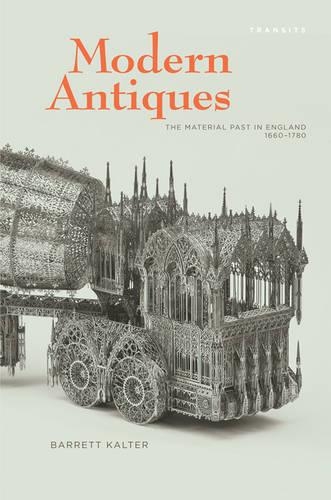
Modern Antiques: The Material Past in England, 16601780
(Hardback)
Publishing Details
Modern Antiques: The Material Past in England, 16601780
By (Author) Barrett Kalter
Bucknell University Press
Bucknell University Press
23rd December 2011
United States
Classifications
Tertiary Education
Non Fiction
820.9005
Physical Properties
Hardback
260
Width 163mm, Height 243mm, Spine 23mm
517g
Description
The recovery and reinvention of the past were fundamental to the conception of the modern in England during the long eighteenth century. Scholars then forged connections between linear time and empirical evidence that transformed historical consciousness. Chronologers, textual critics, and antiquaries constructed the notion of a material past, which spread through the cultures of print and consumption to a broader public, offering powerfuland for that reason, contestedways of perceiving temporality and change, the historicity of objects, and the relation between fact and imagination. But even as these innovative ideas won acceptance, they also generated rival forms of historical meaning. The regular progression of chronological time accentuated the deviance of anachronism and ephemerality, while the opposition of unique artifacts to ubiquitous commodities exoticized things that straddled this divide.
Inspired by the authentic products as well as the anomalous by-products of contemporary scholarship, writers, craftsmen, and shoppers appropriated the past to create nostalgic and ironic alternatives to their own moment. Barrett Kalter explores the history of these modern antiques, including Drydens translation of Virgil, modernizations of The Canterbury Tales, Grays Gothic wallpaper, and Walpoles Strawberry Hill. Though grounded in the ancient and medieval eras, these works uncannily addressed the controversies about monarchy, nationhood, commerce, and specialized knowledge that defined the present for the English eighteenth century. Bringing together literary criticism, historiography, material culture studies, and book history, Kalter argues that the proliferation of modern antiques in the period reveals modernitys paradoxical emergence out of encounters with the past.
Reviews
Kalter's consideration of the appreciation of the past in 18th-century England is part of a new series, "Transits," which aims to publish on varied aspects of thought and culture. Kalter (Univ. of Wisconsin, Milwaukee) treats a wide range of material artifacts and asserts that the period's awareness of history was expressed not only in writing but also in tangible collections. In each chapter, he focuses on authors in light of their interest in or practice of historical scholarship. After looking at the influence of chronology on Dryden's approach to contemporary issues, Kalter turns to Chaucer manuscripts and textual scholarship. Later chapters deal with Thomas Gray's preference for the Middle Ages and Horace Walpole's antiquarianism. The author presents a view of a cultural reworking of the past that makes use of "modern antiques" to offer a model for thinking about history in a rapidly changing century. In some way, Kalter sees the antiquarian mode in 18th-century thought as part of the new nationalism and also of the expansion of print culture and a consumer society. Also valuable for those specializing in the philosophy of history. Summing Up: Recommended. * Choice Reviews *
The classical and medieval past acquires a satisfying tangibility in Modern Antiques: the Material Past in England, 16601780, in which Barrett Kalter argues that the periods consciousness of history was not only expressed in but inextricable from the interdependent spheres of print, consumption, and scholarship'. Kalter in the introduction formulates a historical materialist methodology designed to maintain a double focuson the intellectual and the material, the present and the past, the scholarly and the literaryand thereby to elucidate the complex interactions between history and imagination in the material and print cultures of the eighteenth century. * The Year's Work In English Studies *
Author Bio
Barrett Kalter is associate professor of English at the University of Wisconsin-Milwaukee.
